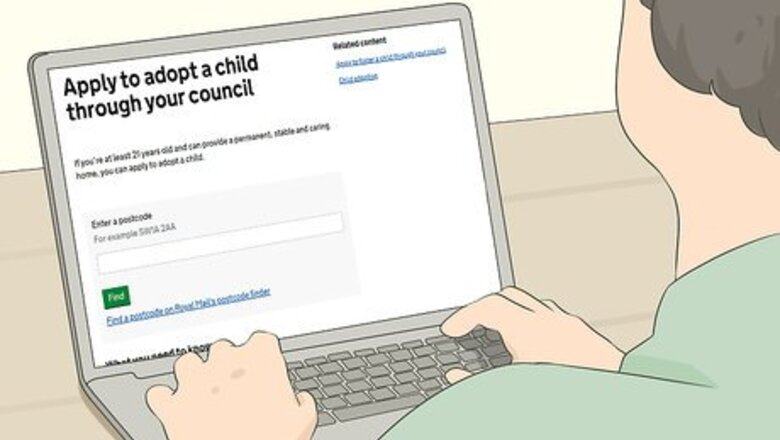
views
X
Trustworthy Source
Official UK government website
Official website for the public sector of the UK government
Go to source
Going through Your Council
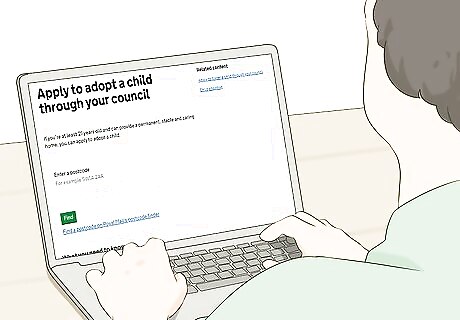
Request information from your local council. If you decide to adopt a child in the care of the government, you must go through your local council. You can also adopt a child from overseas through your local council. To get the location and contact information for your local council, visit https://www.gov.uk/apply-to-adopt-child-through-council and enter your postcode. The local council's website will also have additional information about the adoption process.Tip: If you want to adopt a child from another country, your local council will work in conjunction with a voluntary adoption agency. The process is longer than adopting a British child and you will incur significantly higher costs.

Attend an adoption information event. Your local council holds information events for people who are interested in adopting a child. These events are typically held at least once a month, usually in the town hall. Contact the council directly or check the council's website to find out when the next event is scheduled. Typically, you'll want to book a seat, especially in more populated areas where places may be limited.

Meet with a council social worker. If, after the information event, you decide you are still interested in adopting a child through your local council, you can schedule a meeting with a social worker. The social worker will give you more details about the adoption process and discuss what you can expect. This meeting may be in the social worker's council office or at your home, wherever you feel most comfortable.
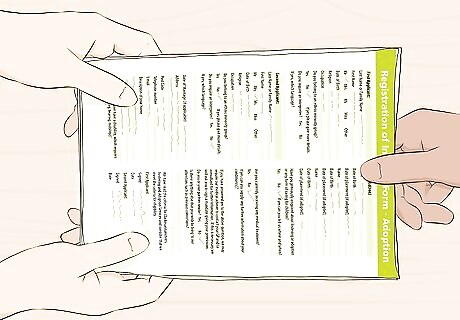
Submit your registration of interest form. When you meet with the social worker, they will give you a registration of interest form. If you've decided you want to adopt a child through your local council, fill out this form and give it to the social worker. Along with the registration of interest form, you will sign consent forms that allow the council to conduct some preliminary background checks. The results of these checks help the council evaluate your suitability to adopt. Within 5 days of submitting your registration of interest form, you'll receive a notice from the council in the mail letting you know if you're cleared to proceed to the next stage.
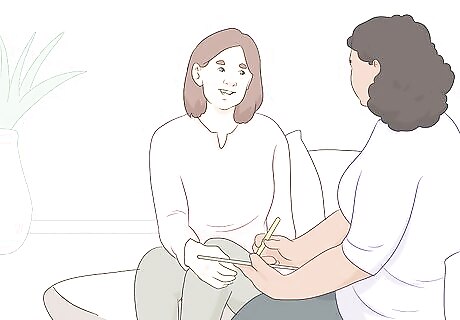
Complete the self-assessment stage. During the self-assessment stage, you'll attend a preparation workshop that addresses some of the issues involved with adoption. You'll then complete a workbook with some exercises that will help get you thinking about adoption and whether this choice is the right one for you and your family. This process also provides the council with some additional information about you and your family. Expect the self-assessment stage to take about 2 months. By the end of this stage, the council will complete additional background checks to determine if you're still considered suitable to adopt a child.

Move forward with the assessment stage. You must notify the council in writing if you intend to proceed to the next stage of the adoption process. The assessment stage is more intense than the self-assessment stage and typically takes at least 6 months. During the assessment stage, your social worker will conduct several one-on-one interviews with you and other members of your family. They will also evaluate the suitability of your home and your general readiness to adopt a child. The social worker will prepare a report covering their observations, the information you provided, and the results of your background checks. When the report is complete, the social worker will give it to you. You'll have 5 business days to read and comment on the report or ask the social worker any questions you may have about it.

Attend the panel for approval. If you decide to go forward with the adoption process, your social worker will submit their report to the adoption panel in your area. The panel will review the report and hold a hearing to talk to you about your case. After reviewing your report and talking to you, the panel will make its decision. If you're accepted, the social worker will start looking for a child that is best suited for your home. The panel may also defer your application, which means the panel believes there's more work you need to do before you're ready to adopt a child. They'll let you know why your application was deferred. Typically, you can make whatever changes or adjustments the panel believes are necessary, then apply again. If your application is denied, you have 40 days to ask for a review of the decision if you believe it was reached in error. You can have the decision reviewed by the same panel or by an independent panel.Tip: The panel may seem intimidating, but try not to be too nervous. The panel is only looking out for the best interests of the child you may adopt. They are not trying to find reasons why you can't adopt.

Get matched with a child. Once you're approved by the panel, your social worker will start looking for a child ready for adoption who seems a good fit for your family. You'll be provided with information about the child to evaluate so you can decide whether this is the child for you. Many councils also have evening events where you can chat with council staff about finding the right child for your household.Tip: Take some time to imagine your life with that child as part of your family. Think about the things you would do and the places you would go. Consider the child's likes and interests and how they would mesh with those of your family.
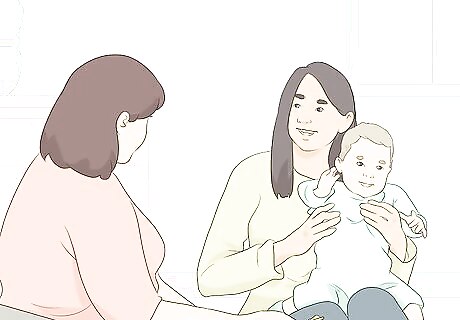
Have your child placed in your home. Once you accept a child matched by your social worker, your social worker will submit a matching report to the local adoption panel for approval. You may have to go back to talk to the panel. You will then be introduced to the child. After introductions, you'll typically have a couple of visits with the child and a meeting with your social worker to plan the placement of the child in your home. If everything goes well, the child will be placed in your home on a temporary or trial basis. During that time, the social worker will visit frequently and talk to you and the child about how things are going and how well the child is adjusting to life with you.
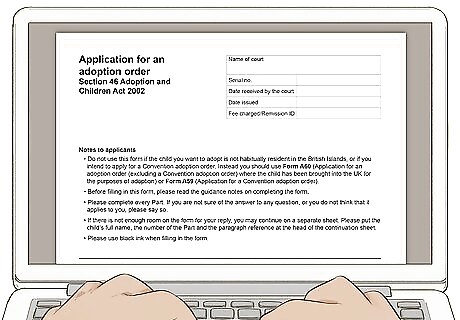
File your adoption order application. After the child has lived with you for at least 10 weeks, you can file an application asking the court for an order finalizing the adoption. Once the judge grants the order, the adoption becomes permanent and you have full parental rights and responsibilities over the child. Your social worker at your local council will assist you in completing and filing the adoption order application and gathering the supporting documents you need. A copy of the social worker's assessment report and matching report typically will accompany your application. You're required to pay a fee when you file your application. The fee is £170, as of 2019. If you can't afford to pay the fee, talk to your social worker about getting assistance with the fee. There will be another form for you to fill out with details about your income and assets.
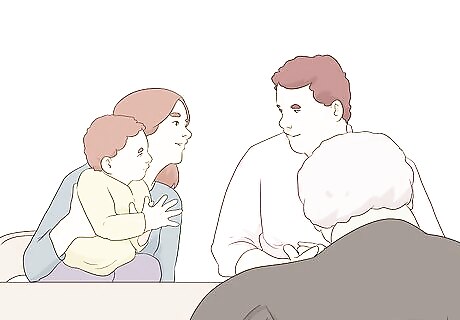
Attend the adoption court hearing. The court will schedule a hearing during which the judge officially grants your adoption order. This is typically considered a celebratory occasion. Adoptive families often invite other family members and friends to attend. The adoption is considered final and permanent from the date of the hearing. A copy of the judge's written order will be mailed to you.
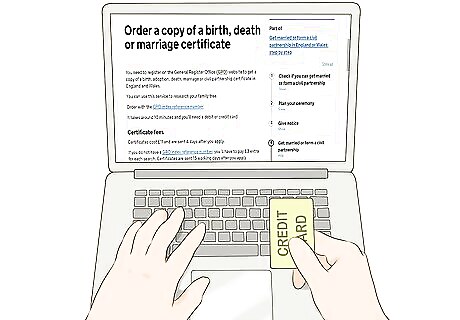
Order a copy of the adoption certificate. The official adoption certificate is created by the General Register Office (GRO) and replaces the child's original birth certificate. This certificate will show the child's new name as you requested in your adoption application. While a copy of the new certificate won't be mailed to you automatically, you can order copies if you need them. A full copy of the certificate costs £11, as of 2019. You can order the certificate online at https://www.gov.uk/order-copy-birth-death-marriage-certificate. You can also download and fill out a paper form at https://www.gov.uk/government/publications/adoption-certificate-application-form and mail it to the GRO. A copy of the adoption certificate will be required for your child to complete most legal tasks, such as having a passport issued in their name.
Using a Voluntary Adoption Agency
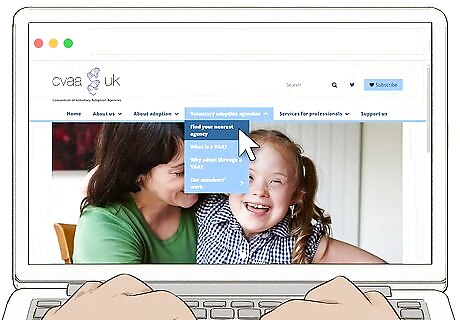
Contact a voluntary adoption agency. When you go through a voluntary adoption agency, you have the opportunity to adopt an infant or a child that hasn't been a government ward. Voluntary adoption agencies may also give you more freedom in choosing a child to adopt. Through a voluntary adoption agency, you can adopt a child in the UK or from another country. To find voluntary adoption agencies near you, visit http://www.cvaa.org.uk/thinking-about-adoption/find-your-nearest-agency/ and enter your postcode. When you contact a voluntary adoption agency, they'll mail you additional information about the process of adopting a child using the agency. You may also find similar information on the agency's website.
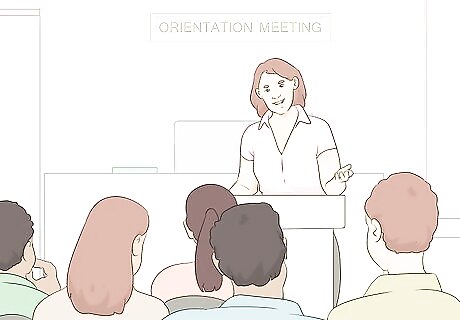
Attend an orientation meeting. Voluntary adoption agencies hold orientation meetings that give prospective adoptive parents a better idea about the process of adopting a child through the agency. Typically, other prospective adoptive parents will also be in attendance. In addition to talking to agency staff and social workers, you may also get the opportunity to talk to other adoptive parents who have adopted a child through the agency. There will also be a time during the meeting when you'll have the chance to ask any questions you may have about the adoption process.
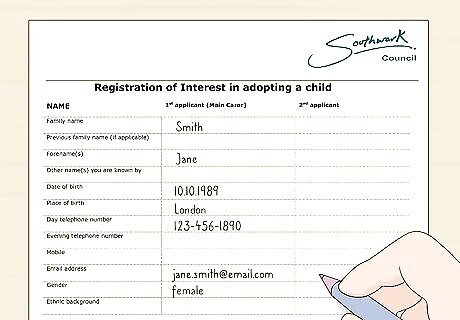
Complete the agency's application form. Each voluntary adoption agency has its own application that it uses for preliminary evaluation of your readiness to adopt. Typically, you will need to provide basic information about yourself (and your partner, if you have one), including your personal, educational, and work background. Filling out this form indicates to the adoption agency that you intend to go forward with an adoption through that agency.
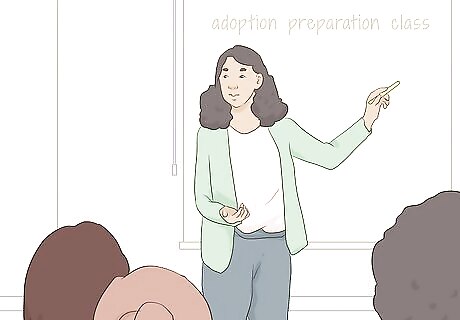
Go to adoption preparation classes. Your agency will offer classes that are designed to get you ready to adopt a child. The classes will provide more in-depth information about the adoption process and some issues you may encounter as you welcome a new child into your home. If you're adopting a child from another country, you may have additional preparation classes to take that deal with the international adoption process and the culture of the country where you're looking to adopt. You may also have classes with experienced adopters, who will share their experience with you to help you better understand what it's like to adopt a child.
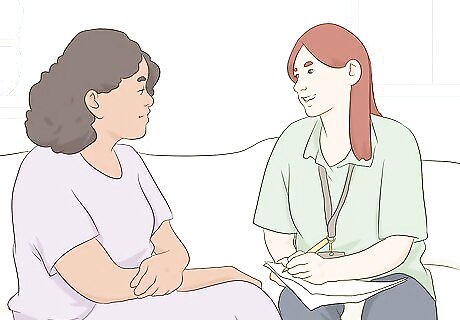
Participate in your adoption assessment. During the adoption assessment, you'll have several one-on-one interviews with a social worker about your personal background, education, and career. You'll also discuss the reasons you want to adopt a child and your parenting style. The social worker will likely visit your home several times and make recommendations for changes you can make to prepare for an adopted child. These changes may include safety precautions and child-proofing, depending on the age of the child you want to adopt. The social worker will also interview other adults in your home, older children (if you have any), and other family members who would spend time with any child you adopted. When the assessment is complete, the social worker will complete a report with their observations and information about you as a prospective parent. You'll have some a week to read through this report and ask the social worker any questions you might have about it before the social worker submits it to the local adoption panel.
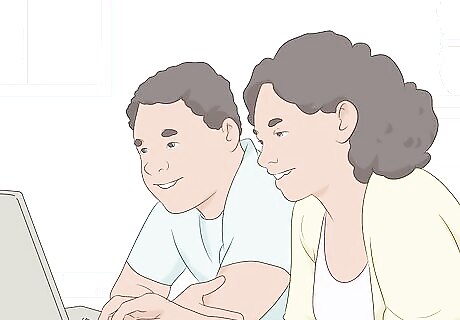
Find out if you're eligible to adopt. Once your social worker has completed your assessment report, they will present your case to your local adoption panel. The panel may also review you regarding your decision to adopt and the preparation and training you've completed. The panel will confer with your social worker and the agency. The agency will contact you and let you know the decision of the local adoption panel. If the panel feels there are things you should do before you are approved to adopt, the agency will help you accomplish those tasks.

Work with the agency to find a suitable child. After you're approved as adoptive parents, your social worker will start the search for the best possible match for you and your family. When looking for a match, the social worker will take into account your preferences, as well as your background, experience, and skills. When your social worker finds a suitable child, they'll present a "matching report" with information about the child and why the social worker believes this child would be a good fit in your home. Ask any questions you may have as you take time to consider whether you want to introduce that child to your home. If you decide you want to meet a child chosen by your social worker, they will arrange an introductory meeting. Your initial meetings with the child will be short as you get to know each other, and the social worker typically will be present.Tip: When looking for a match, the best interests of the child are a priority over your personal interests or preferences. Your social worker will look to find the child that would do best in your home, rather than the child they think you'll like the best.

Pay your agency fees when a child is placed in your home. As of 2020, the fees for adoption through a voluntary adoption agency are £32,063. These fees are payable in full when a child is placed in your home. If you're adopting a sibling group, the fee may be higher. This fee covers not only the adoption process, but also continued support throughout the first year the child is placed in your home. Voluntary adoption agencies also provide lifelong support for your family, including counseling and intermediary services you or your family might need.
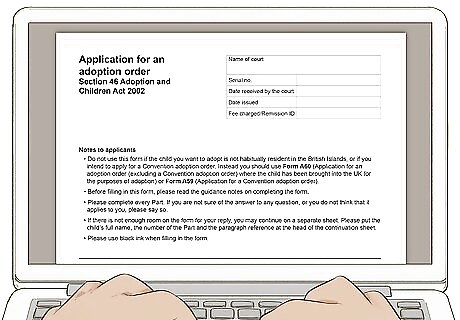
Apply for an adoption court order. After the child has lived in your home for at least 10 weeks, the agency will get the paperwork together to make the adoption final. Only a court order from a judge can transfer full parental rights and responsibilities to you. Your social worker at the agency will help you complete the necessary forms to request this order. The court fees for your adoption order are included in the total fees you paid to the voluntary adoption agency when the child was placed in your home.
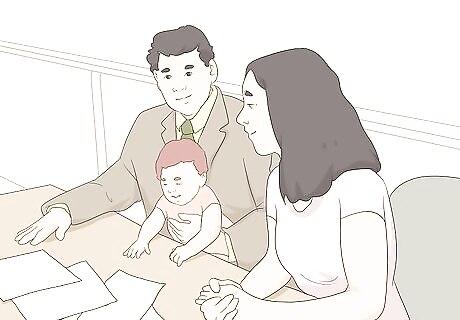
Attend a celebration hearing at your local family court. The judge presiding over the hearing has already reviewed your application and decided to grant your adoption order. The hearing is merely a formality. However, it is an important one. The judge will ask you questions about your intent to adopt the child and your promise to care for that child. The judge may ask the child questions as well, depending on their age. Adoptive families typically invite family and friends to witness the ceremony.
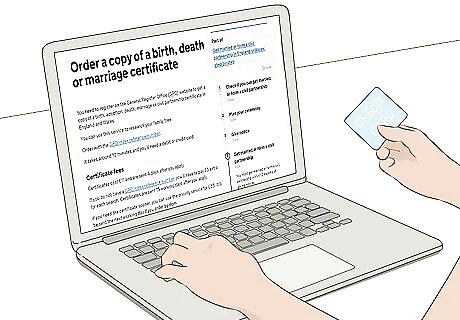
Order a copy of your child's adoption certificate. Your child's adoption certificate will not be automatically mailed to you. However, you want to order at least one copy. You'll need it for any legal task when you would need to show your child's birth certificate, such as to enroll your child in school or have a passport issued. As of 2019, adoption certificates cost £11 each. You can order one online at https://www.gov.uk/order-copy-birth-death-marriage-certificate. Your voluntary adoption agency may include at least one copy of the adoption certificate with the fees you paid when your child was placed in your home. Ask your social worker if you're not sure.
Applying to Adopt a Stepchild
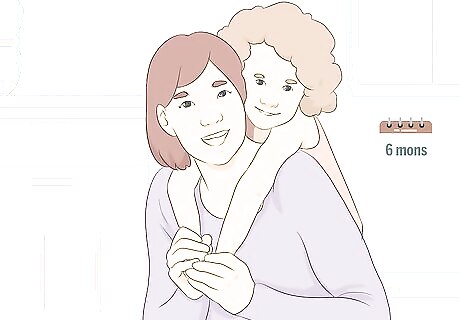
Live with the child for at least 6 months. If you enter a marriage or civil partnership with someone who already has a child, you may want to adopt that child as your own. Adopting a stepchild is most common when the child doesn't have an established relationship with the other parent. Before you can apply with the court to adopt the child, you and your partner must live with the child as a family unit for at least 6 months. It's okay if the child spends some time with the other parent as a result of a visitation order or agreement. However, your partner should have primary custody of the child.
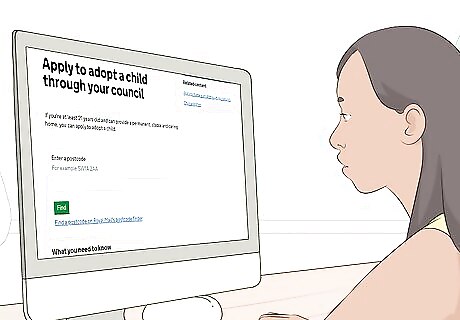
Contact your local council at least 3 months before you request an adoption order. When you adopt your stepchild, the local council in the area where you live with the child handles the adoption process. While the process is somewhat abbreviated compared to adopting an unrelated child, you'll still have to complete a basic adoption assessment. To find your local council, go to https://www.gov.uk/find-local-council and enter your postcode. If you adopted an unrelated child, you could expect the adoption process to take at least 6 months to complete. Adopting a stepchild, however, typically only takes about 3 months.

Complete your adoption assessment. A social worker at the local council will compile a report with information about you, your partner, the child, and the child's other parent. The report helps the judge decide whether they should enter an adoption order. The social worker typically will interview you and your partner several times. They may also interview the child's other parent and the child (depending on the child's age). The social worker will also evaluate the home you share with your partner and observe how you and the child interact in that setting.Tip: Unlike when you adopt an unrelated child, you don't need approval from the local adoption panel to adopt a stepchild. After the assessment is complete, you can immediately apply for an adoption order from the local family court.
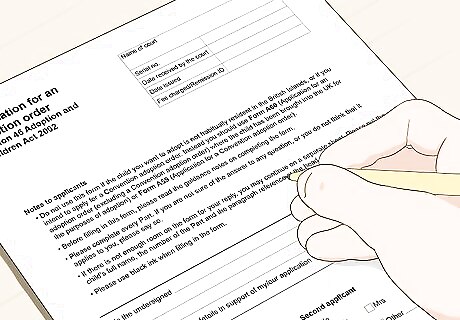
Fill out your application for an adoption order. The application asks the court to issue an adoption order that would give you parental rights and responsibilities for your stepchild. The order would also take away parental rights and responsibilities from the other parent. You can download a copy of the form at https://www.gov.uk/government/publications/form-a58-application-for-an-adoption-order-section-46-adoption-and-children-act-2002. Adoption of a stepchild typically is only possible with consent from the other parent. If the judge enters an adoption order, it supersedes any other court orders, including any previous court orders requiring child support from the other parent, or giving the other parent visitation rights.
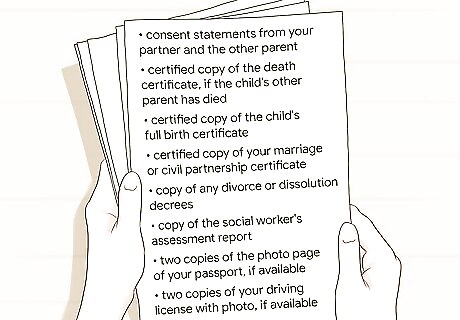
Gather documents to support your application. Along with the application, the court requires documents that provide evidence of the facts that you listed in your application. While the specific documents may vary somewhat depending on your situation, for a stepchild adoption order, you'll likely need the following: Consent statements from your partner and the other parent A certified copy of the death certificate, if the child's other parent has died A certified copy of the child's full birth certificate A certified copy of your marriage or civil partnership certificate A copy of any divorce or dissolution decrees for any previous marriages or civil partnerships A copy of the social worker's assessment report Two copies of the photo page of your passport, if available Two copies of your driving license with photo, if available

File your application and supporting documents with the nearest family court. Once you've gotten your supporting documents together, make 3 photocopies of the entire package, including your completed and signed application. Take the originals and the copies to the Family Centre nearest you. To find the family court nearest you that handles adoption applications, go to https://courttribunalfinder.service.gov.uk/search/ and select the option to search by the area of law you are interested in. Then select adoption on the next page. Scroll down to continue, then enter your postcode on the next page.

Pay your adoption application fees. As of 2019, the fee for adoption order applications is £170. You typically cannot pay this fee online. Pay in person at the family court office using a debit or credit card, cash, postal order, or cheque. If you use a postal order or cheque, make it payable to "HM Courts & Tribunals Service." You can also pay by debit or credit card over the phone. Contact the court where you're filing your application. If you have low income and few assets, you may qualify for help with your application fees. Visit https://www.gov.uk/get-help-with-court-fees to see if you qualify. If you don't have internet access, you can get a paper form from the court staff at the family court office.
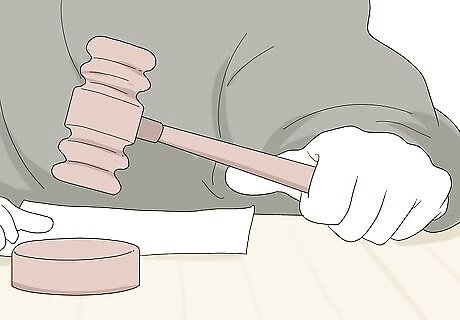
Attend your "first directions" hearing. About 4 weeks after you file your application, the court will schedule a hearing to discuss your case and what will happen next. The length of time between this hearing and your final hearing depend on the complexity of your case. For example, if the child's other parent has not consented to the adoption and plans to contest it, the court may appoint an officer to act as the child's representative in the proceedings. If the other parent cannot be found, an officer of the court may be appointed to trace the other parent and attempt to locate them. If you have consent from the child's parents and all of your supporting documentation is in order, the judge will likely schedule your final hearing.Tip: If the child's other parent is contesting the hearing, it's a good idea to hire a solicitor to represent you.

Attend the final hearing to enter the adoption order. At the final hearing, the judge will ask you and your partner questions about the adoption. They may also talk to the child, depending on the child's age. If everything is in order, the judge will grant the adoption. If the other parent contests the adoption, the final hearing will be much longer and more formal.
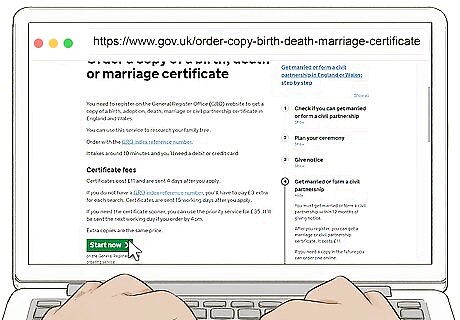
Order copies of the adoption certificate. You'll receive a written copy of the adoption order after it is entered. However, you won't automatically get a copy of the official adoption certificate. You'll need a full copy to complete legal tasks involving your child, such as enrolling your child in school or getting them a passport. You can order a full copy of the child's adoption certificate online at https://www.gov.uk/order-copy-birth-death-marriage-certificate. The fee for each copy is £11, as of 2019.




















Comments
0 comment